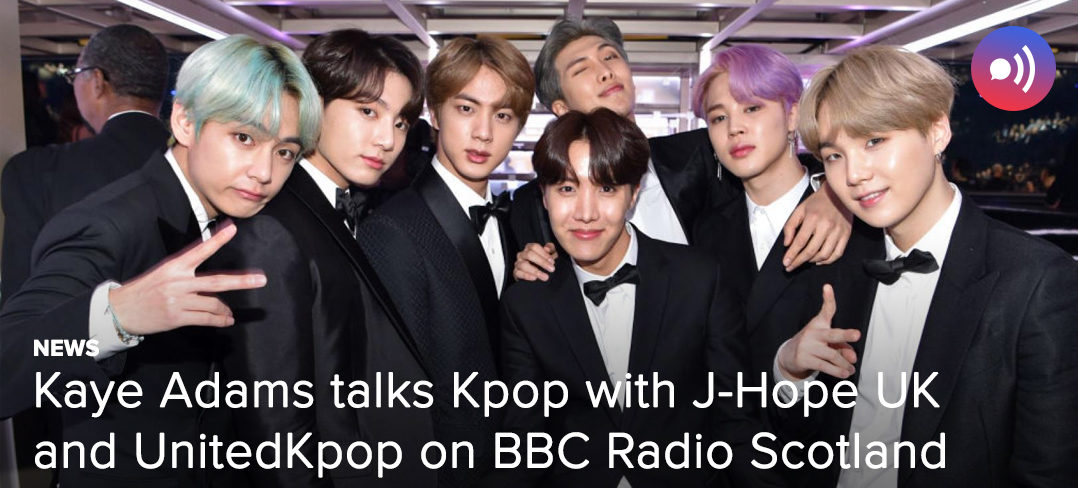BBC Radio Scotland’s Mornings with Kaye Adams took a few minutes to discuss Kpop today.
After seeing the news that J-Hope fanbase ‘J-Hope UK’ had raised money to adopt Scottish Squirrels in honour of the BTS rapper’s 25th birthday, BBC Radio Scotland reached out to J-Hope UK and UnitedKpop to find out more about the project and Korean music.
The show lists the segment as:
K-POP
A group of K-pop fans have adopted some Scottish red squirrels to celebrate BTS singer J-Hope’s birthday. What is K-Pop and how big is it in Scotland? Lisa Ireland runs the J-Hope UK Fanbase and Lore Walsh is the CEO of UnitedKpop (a website for news of K-Pop in the UK and Europe).
You can listen to the show for 30 days via BBC iPlayer Sounds, the chat features at the 2-hour and 1-minute mark, or read the transcript below.
[previous talk about what makes you feel like a kid again]
Kaye: Maybe this’ll do it for you. They’re the biggest thing to hit the music scene in many a year
BTS clip
Kaye: That’s Korean pop band BTS who sent their fans wild when they appeared on the Graham Norton Show recently.
BTS on Graham Norton Show clip
Kaye: Yeah, they are becoming, they already are a global phenomenon. They have such a devoted following. And one of the band members, J-Hope, turned 25 British fans raised nearly £700 to adopt 37 Scottish Red Squirrels on his behalf. Yes, I know, I don’t know either so let’s ask one of the women behind this unusual gift, Lisa Ireland, who runs the J-Hope UK fanbase – Morning Lisa.
Lisa: Good morning
Kaye: So what’s the connection with Scottish Red Squirrels?
Lisa: Well, it’s a bit strange actually, basically for a long time fans have thought J-Hope kind of looks like a Red Squirrel, especially when he’s eating and his dimples are showing. So, we’ve had this idea for a while, but this is the first time we’ve actually tried it out so, yeah that’s it really.
Kaye: So what, a bunch of you in a fan club, I mean that sounds a very 1970’s term ‘fan club’, do you still have fan clubs?
Lisa: Er, they’re kinda called fanbases – more kind of social media based. So they’re kind of run on Twitter mainly.
Kaye: So a bunch of you got together and thought ‘this will be a nice gift for him’ you can’t really give it to him, can you?!
Lisa: Well actually, J-Hope asked the fans this year to do something for his birthday in the name of charity. and what happened is at least 35, I think it’s probably a lot more than that, but at least 35 official projects have been run around the world for his birthday this year. So for some people, this is something that we do regularly, but for birthdays, in particular, it tends to be a surge in these kinds of projects. For example, some people in Peru, J-Hope’s fans in Peru actually donated towards surgeries for children and in Bangladesh ARMY, ARMY is the name of the fans, have actually served lunch to the homeless on his birthday. So these projects are really diverse, ours is not the biggest by far, but it’s been receiving a lot of attention, so we’re really grateful for that.
Kaye: So I don’t know much about BTS, but just in what you’ve told me there, they’ve obviously got quite a strong influence and dialogue going on with their fanbase.
Lisa: The thing that really motivates us, because I guess the fans are closer with them than most fans are with their artists, they communicate with their fans a lot through social media, through live-streaming, videos and things like that. And their message is very positive, it’s not that they never talk about negative things, of course, they talk about a lot of really important issues, in their songs they open up about mental health, corruption, and their big theme recently is self-love, the whole kind of topic is ‘Love Yourself’ for the album and the concerts. But I think that because of their positivity it really inspires the fans to be the same and it’s so motivating as a fan when you can see the result of these incredible projects and because of the size of their fanbase now, we really have potential to do so much – so it’s amazing to me really.
Kaye: So what got you into it, or into them I should say?
Lisa: It’s kind of hard to say now, it was a few years ago, but I just watched some videos of them and I really liked their album at the time – the ‘Wings’ album came out when I just started to find out about them, and I just thought they were great and it went from there. It’s hard to say, because for the first few months I really didn’t know much about them but you just kind of learn things over time and before you know it you’re obsessed.
Kaye: So presumably you’ve made lots of friends through this and a whole set of new connections?
Lisa: Yes, of course! I think particularly with this fandom, being connected is really important. If you meet someone on the street and they’re wearing a BTS hoodie most of us will be like ‘Oh hi, I’m a fan too!’ It’ so weird because a few years ago you wouldn’t expect to see anyone, live ever, and I think the first time I saw someone was just over a year ago in Sterling, and I was just like ‘oh my god, it’s a fan, I can’t believe it, I’ve never seen one in real life, I’ve only ever spoken online’ so I said ‘hi’ and they were so nice and I remember talking to them and ever since then it has happened so regularly. I’ve been working in this really tiny town in Spain, and there’s two fans in the school here. When I saw them I couldn’t believe I’d found fans in this random place in Spain. This is amazing.
Kaye: I did describe them as a global phenomenon, and it’s not just one of those throwaway lines because they have got the most incredible reach. We’ve also got with us Lore Walsh who is the CEO of UnitedKpop which is a website for news of Kpop in the UK and Europe. Hi Lore.
Lore: Hi
Kaye: So BTS, are they the kind of biggest Kpop band around, because it’s not just them is it?
Lore: They have the biggest global reach, they’re not actually top of the top in Korea, but it is hard to deny that they are the ones that have had this global reach, that has happened to appear – if you look at it from a music standpoint for the first time since the 90s when we haven’t had a big boyband to capture attention, they filled that spot. Globally, definitely the biggest of the groups.
Kaye: So maybe for listeners who are not so familiar with the terminology, what is Kpop? How would you explain it.
Lore: Kpop as a term, just means Korean pop. As an industry, it doesn’t necessarily just mean pop music made in the Korean language. Kpop is very much a complete cultural industry. These artists can train for years and years, there are people who have come out with music in the last two or three years that have spent fifteen years training – the industry standard is probably about five. But they train in every single aspect of entertainment to make them not just a ‘triple-threat’, as you would say in the industry, but great at everything: dancing, singing, rapping, acting, how they speak to the public. Probably the easiest association is if you look back to the nineties and you at people like Take That and Boyzone – they way they were trained to talk to the media, to cover up things like dating, that still happens in the industry in Korea. That is probably the easiest thing to relate it to.
Kaye: So who’s controlling the industry then, is there a Korean Louis Walsh, Stock, Waterman and Aitken or Simon Cowell?
Lore: There are some companies that are bigger than others, and probably until BTS started surging up, had the grasp on everything that happened in Kpop. All the smaller companies would sort of watch what they did. Companies like SM Entertainment still have a major hold in the industry – we’re talking hundreds of millions of US dollars. Now we are seeing some of those smaller companies and smaller groups emerging because people like BTS and their company Big Hit have proven that you don’t need to be one of the big two or three companies to really make your mark.
Kaye: So how much control do the band members themselves have, or are they just basically employees of the Kpop industry?
Lore: I think it’s very different and it’s certainly changed in the last few years, you used to find that they would have no input what-so-ever. They would be given a song, produce it, sing and dance on stage, they would be told what they could say to the media, and that would be it. But now with people like BTS, and other in the industry like SHINee, and Monsta X, members from those groups are writing and producing their own music, they’re working on their own choreography. I think that’s helped the industry have a better voice globally because although it is still a massively manufactured industry, these artists are now proving that they’re just as talented as their western counterparts and not just a puppet in the machine.
Kaye: You say just as talented as their western counterparts, I did happen to see BTS on the Graham Norton Show, and I have to say, what was very striking was their western look. They all looked very, very groomed, I’ll be honest they looked to me as if they had had some facial surgery, and I apologise Lisa if that’s untrue and unfair and I am slandering them in some way, I do apologise. But that’s what it looked like to me, is that part of the whole image as well?
Lore: It is to some extent. Again, where you might be looking five or ten years ago you would see it a lot more. I mentioned SM Entertainment, a lot of their artists have had cosmetic surgery. I’m not personally sure if anyone in BTS has, but it’s still very prevalent in the industry and in Korea in general. There’s a massive surgery culture over there and it is still going to be a part of the industry. They do take a lot of influence from western pop, they’re going to! The western counterparts are getting there first with the sounds, the looks – they’re always going to take those influences. It works for the Kpop industry and it seems to now be working for them globally as well, so those sort of things are prevalent but not damaging them in any way and never really have.
Kaye: So Lisa, have you actually seen them live?
Lisa: I have, I saw them in London, at both concerts last October.
Kaye: Was it good?
Lisa: It was amazing, it was honestly the best time of my life, it was absolutely phenomenal. The performances and everything was surreal. I can’t wait, they’re coming back in June to Wembley Stadium. So really hoping to get to go again.
Kaye: I take it tickets are fairly scarce on the ground, are they?
Lisa: There’s a lot of tickets, but there are a lot more fans.
Kaye: Hopefully you get to the top of the queue. Lisa, Nice to speak to you, thank you very much indeed. And Lore, lovely to speak to you as well, Lore Walsh who is the CEO of UnitedKPop.





